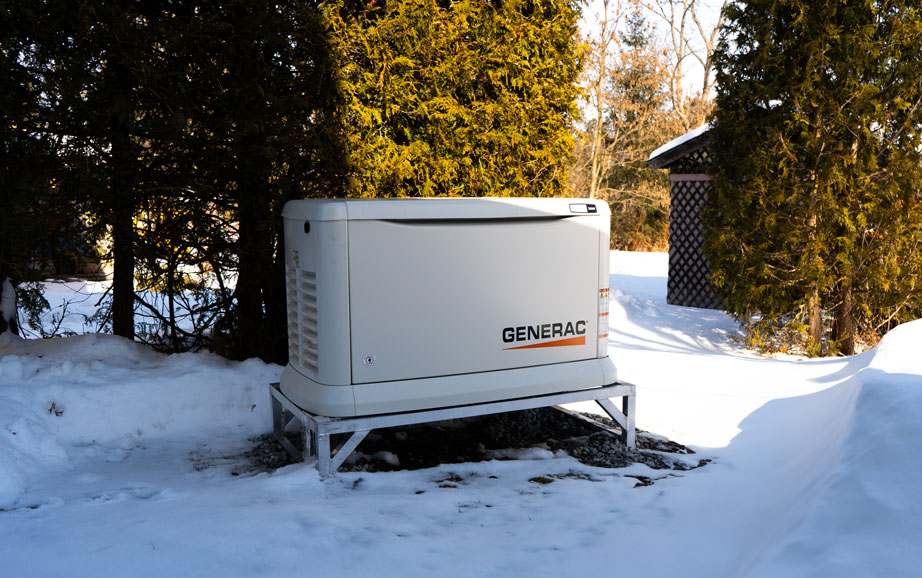Products
Services
Online Store
Other Resources

Choosing the right standby home generator is crucial for homeowners, especially those in areas prone to power outages. Standby generators are essential for ensuring that your home remains powered during an outage, providing peace of mind and uninterrupted comfort. In this comprehensive guide, we will explore the different types of standby home generators based on application, capacity, fuel type, and cooling systems. With Platinum Electrical Contractors, the only Power Pro Premiere Generac dealer in GTA, you can find the perfect generator solution tailored to your needs.
The first step in selecting a standby home generator is to determine whether you need a residential or commercial generator. This decision will guide you in selecting the appropriate capacity, phase, fuel type, and cooling system.
Residential generators are designed to provide backup power for homes. They come in various sizes to accommodate different power needs, from small homes to large estates.
Pros:
Cons:
Commercial generators are built to provide backup power for businesses and commercial properties. They are generally larger and more powerful than residential generators.
Pros:
Cons:
Once you have determined the application, the next step is to decide on the generator’s capacity and phase. Capacity is measured in kilowatts (kW) and determines how much power the generator can provide. The phase refers to the type of electrical load the generator can handle, with single-phase being common for residential use and three-phase for commercial use.
Single-Phase Generators:
Three-Phase Generators:
After determining the application and capacity, the next step is to choose the fuel type. The most common fuel types for standby home generators are natural gas, propane, diesel, and bi-fuel (natural gas and diesel).
Natural Gas Generators
Natural gas generators are the most popular choice for urban and suburban areas due to their convenience and efficiency. These generators are connected to the natural gas lines that supply your home, providing a continuous fuel source.
Pros:
Cons:
Propane Generators
Propane standby home generators are commonly used in rural areas or locations where natural gas is not available. Propane is stored in large tanks on the property and can provide a reliable fuel source for standby generators.
Pros:
Cons:
Diesel Generators
Diesel generators are less commonly used in residential settings due to their higher emissions and fuel storage requirements. However, they can be an excellent choice for specific applications where other fuels are not practical.
Pros:
Cons:
Bi-Fuel Generators
Bi-fuel standby home generators use a combination of natural gas and diesel, providing flexibility and reliability. These generators can start on diesel and switch to natural gas, ensuring continuous operation even if one fuel source is depleted.
Pros:
Cons:
The final step in selecting a standby home generator is to decide on the cooling system. The two main types are air-cooled and liquid-cooled generators.
Air-Cooled Generators
Air-cooled generators use fans to blow air across the engine to keep it cool. These systems are simpler and less expensive than liquid-cooled generators, making them a popular choice for residential use. Air cooled house generators have been chosen by many house owners in Ontario because of their beneficial features.
Pros:
Cons:
Liquid-Cooled Generators
Liquid-cooled generators use a radiator and coolant system, similar to an automobile engine, to dissipate heat. These systems are more complex and expensive but provide superior cooling for larger, more demanding applications.
Pros:
Cons:
For most residential properties, the best option is a single-phase natural gas air-cooled generator. This combination offers the best balance of cost, capacity, and convenience. Natural gas provides a continuous fuel supply at a lower cost, while air-cooled systems are simple and cost-effective, making them ideal for typical home power needs.
At Platinum Electrical Contractors, we understand that every home and business has unique power needs. As the leading Generac dealer in Ontario, we offer a wide range of standby home generators, including natural gas, propane, diesel, and bi-fuel options. Our goal is to provide the best possible solution, not just sell a product.
Why Choose Platinum?
Investing in a standby home generator is a wise decision for ensuring an uninterrupted power supply during outages. Whole home generators provide peace of mind by keeping your essential appliances and systems running smoothly, regardless of the external power situation. Whether you’re considering home generators for residential use or commercial generators for your business, understanding the different types and their benefits is crucial.
When choosing whole home generators, it’s important to assess your power needs accurately. Residential generators, such as single-phase natural gas air-cooled generators, are often the best choice for homeowners due to their lower cost and higher efficiency. For those in urban and suburban areas, natural gas generators offer continuous fuel supply and minimal maintenance, making them a reliable and cost-effective option. On the other hand, commercial generators require higher capacity and may benefit from liquid-cooled systems for better durability and performance.
A member of our team will be in touch shortly to discuss how we can help to meet your needs.